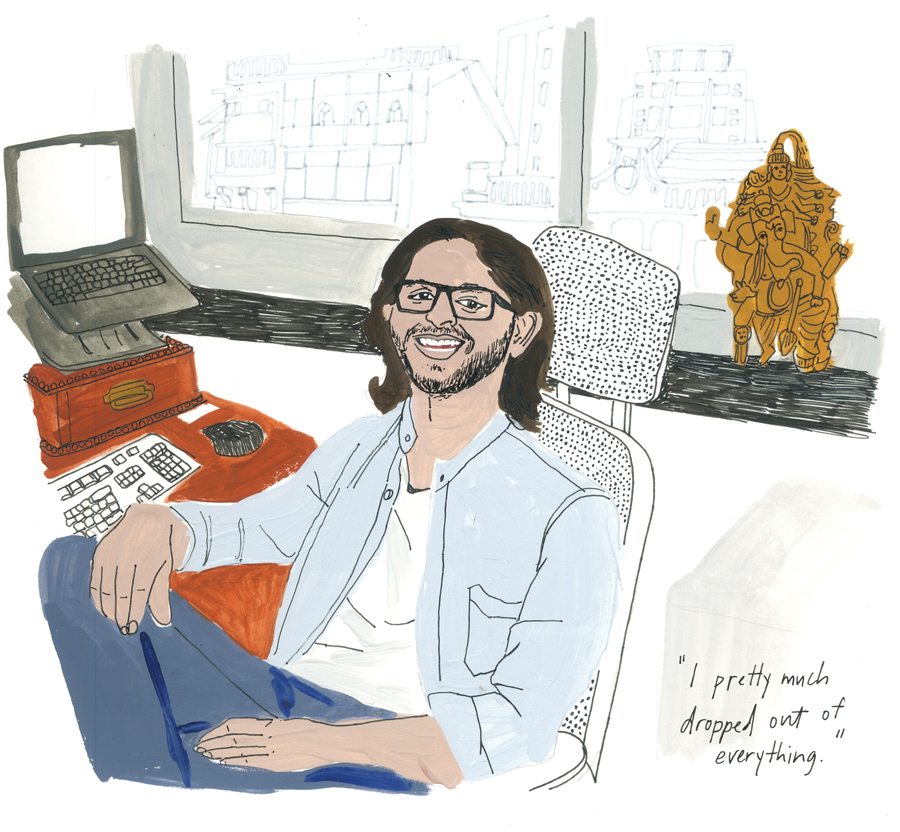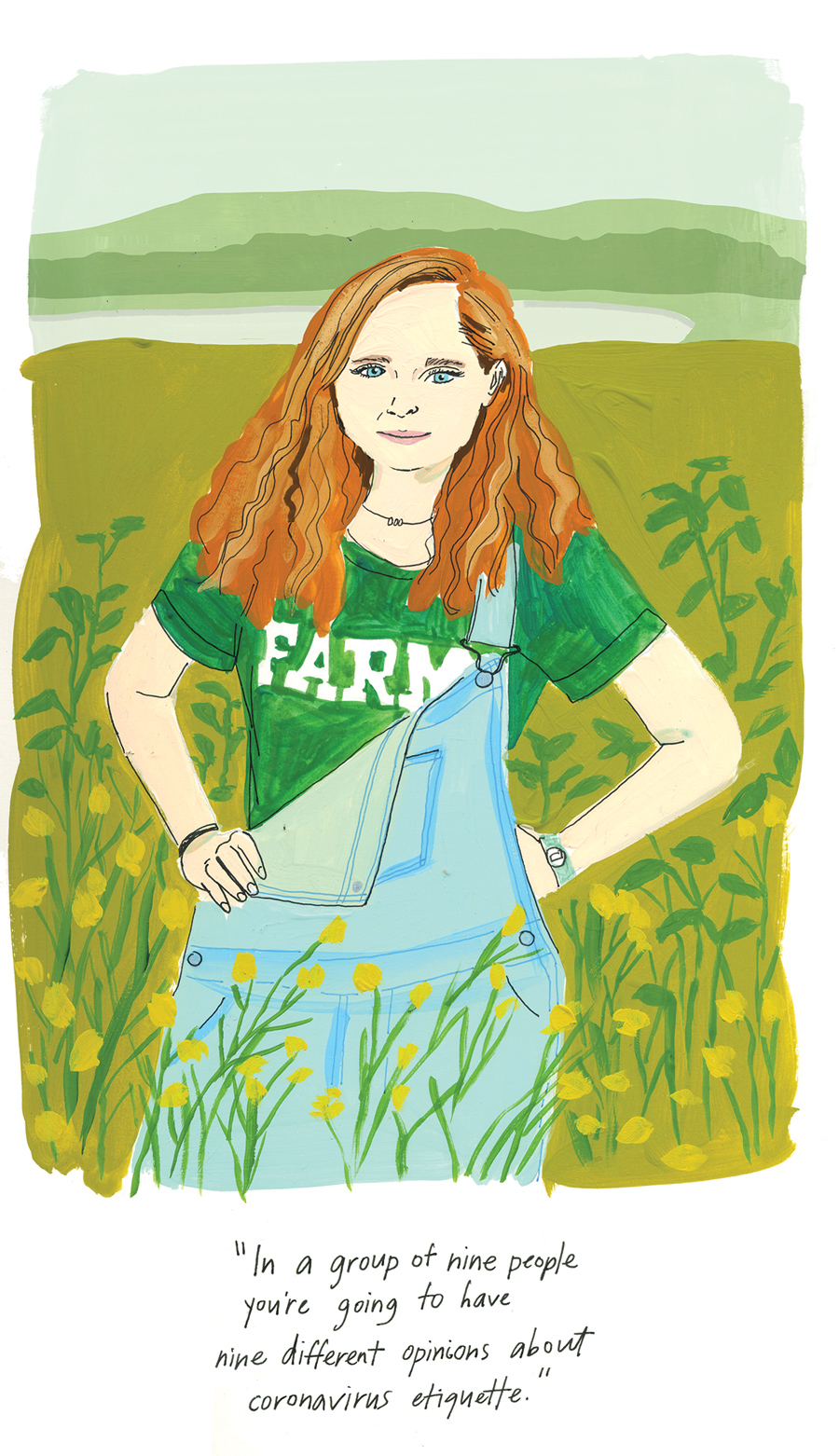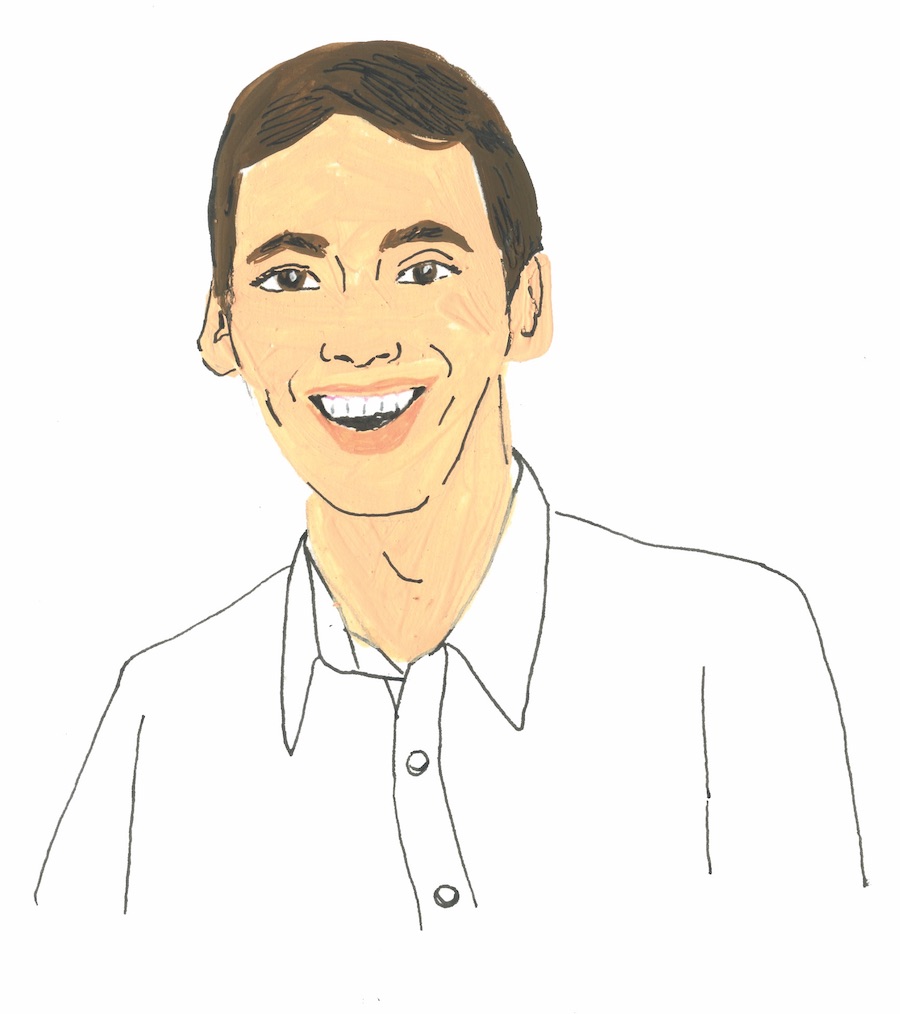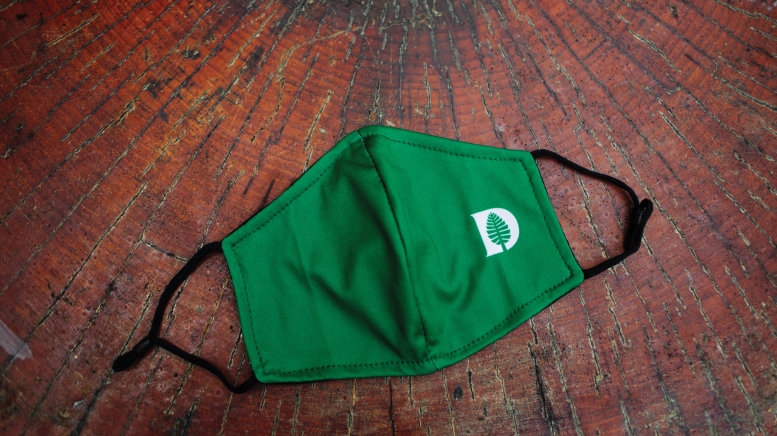Illustrations by Julia Rothman

OLIVIA AUDSLEY ’21
Rochester, New York
Latin American, Latino, and Caribbean Studies
It was midway through last spring when Olivia Audsley realized her senior year would be a major disappointment. “I feel like my Dartmouth experience has been really ‘go, go, go,’ just like so many other students, and I was really looking forward to a year of fun and rest and not having a lot of responsibilities,” she says. “It was upsetting to lose that and realize that this is not going to be an easy year, it’s not going to be with friends.”
When the College decided to send everyone home at the beginning of the pandemic, Audsley became alarmed about the number of students who suddenly faced food and housing insecurity and had lost their student jobs. She cofounded the Dartmouth Student Union, a mutual aid group, in March 2020 and within two months it had provided stipends to about 40 students.
Before the pandemic, Audsley was elected president of Casque & Gauntlet, the only senior society with a residence for students in Hanover. Being unable to live in the house because of the pandemic stung, but even worse, the alumni board of C&G proposed shutting down the society for the 2020-21 academic year. “They didn’t think that the virtual experience would be the same,” says Audsley. The students “fought back,” she says, and persuaded the board to let the society remain active.
The fall term “was actually a lot better than I expected,” she says. “With the weekly testing and social-distancing mandates and everything, I felt pretty safe on campus.” Audsley spent the winter in Rochester, taking classes remotely, then returned to Dartmouth this spring. “I definitely lucked out,” she says, “being able to be back for two of the three quarters on campus.”
All of Audsley’s extracurriculars have continued virtually. “I think the classes are the hardest things to transfer online,” she says. “My biggest issue is self-motivation at home. I’m a big library girl, so working from my bedroom is difficult.”
Audsley decided not to write a senior thesis because of the pandemic. “I did research during the summer for it and then I just wanted to give myself a break,” she says. “It was just really, really difficult to do virtually and not have all of the library’s resources and not have access to my professors and things like that.”
Being forced to adjust her schoolwork hasn’t been the only consequence of the pandemic. “My standards of cleanliness have risen astronomically,” Audsley says. “Thinking about being in a store or airport without a mask on just grosses me out now. On a more serious note, I’ve learned the centrality of community and the intimate connections between people. Our survival is tied to that of each other’s and we need to be fighting for everyone.”
Audsley plans to start a master’s program in women and gender studies at the University of Toronto this fall.

RACHEL FLORMAN ’21
New York City
Geography modified with Government
“Can you tell I like to be busy?” asks Rachel Florman after rattling off a list of her extracurriculars: the Subtleties a cappella group, Sigma Delta sorority, the Student Union, the DOC, first-year trips directorate, Sexual Assault Peer Advisors, the Dartmouth Democrats, and Planned Parenthood Generation Action. During her junior year Florman studied abroad in the fall and then had an off-campus internship for the winter, which kept her away from many of those activities. She was eager to return to her busy life on campus in spring 2020—when the pandemic sent her home to Manhattan.
“I don’t think I left my apartment for almost a full month,” she says. “I’m extremely lucky that I had the privilege to stay inside and my family was safe. But it was definitely hard.”
By the end of the spring her a cappella group had figured out how to hold virtual rehearsals somewhat successfully, but “proposing my thesis virtually was terrible,” she says.
Florman is on the executive board of Sigma Delta and says the board struggled to recreate the sorority experience online. “We’re supposed to be a social space, but we’re also supposed to be a support network and a sisterhood,” she says. “We had to navigate what that meant in a virtual setting, particularly when it came to supporting sisters who were experiencing loss or were particularly affected by the Black Lives Matter protests.”
Florman was able to live in the Sigma Delta house in Hanover this winter and spring, but she took off last fall, which means she’ll have to take classes this summer in order to graduate. “It wasn’t something I had a hard time deciding,” Florman says. She prioritized being on campus this winter and spring so she could have some semblance of a traditional senior experience.
Florman says she has surrounded herself with people who are being careful, Covid-wise, and feels safe in her sorority house and on campus. “I have had to distance myself from some social situations that I would otherwise really want to be a part of,” she says. “I have friends who are living off campus and maybe not following all the guidelines the school puts out. I love them dearly, but I just can’t reconcile that with the world we’re living in right now.”

BRENDAN BARRY ’20
Fair Haven, New Jersey
Government
“If you told me back before I had my injury that I’d be a fifth-year student at Temple, playing games that are being switched all around and going through Covid pauses and getting tested every day?” asks Brendan Barry, speaking from his Philadelphia apartment. “It’s just surreal.”
Barry had surgery on both his hips in September 2019, which prevented him from playing basketball at Dartmouth during his senior year. The Ivy League doesn’t allow grad students to play sports, so Barry entered the NCAA transfer portal. “I just wanted to see what my options were,” he says. Barry ended up staying put and petitioned the registrar’s office to take spring 2020 off and re-enroll for the fall and winter: “I was planning to take two classes in the fall and then two in the winter so I’d be able to play and wouldn’t be a grad student, I’d just be a fifth-year.”
When the Ivy League announced in July that fall sports were canceled, Barry saw the writing on the wall. He changed his plans again. A Temple University coach had contacted him in late August, when it was still unclear whether the Ivy League, or any other schools, would hold winter sports—and a basketball season. Barry enrolled in four classes in the fall and took them remotely, “just to be prepared if the Ivy League ended up canceling,” he says. The cancellation came in November. Barry graduated from Dartmouth in December. Next stop: Philadelphia, where he started practicing with the Temple team and enrolled in a master’s program in innovative management and entrepreneurship.
Barry had kept in shape as he completed his fall courses from his parents’ house in New Jersey, where he worked out daily despite an uncertain future. One of his Big Green teammates, Aaryn Rai ’21, moved in. “He’s from Toronto and he didn’t have access to a gym,” Barry says. “I was lucky to have access to a gym pretty much every day and a weight room and things like that. It was great having him around. My family loved having him.”
The NCAA has announced that players such as Barry can have another year of eligibility. “I’m still not sure if I’m going to use that or not, but I’d like to play basketball as long as I can,” he says.
After Temple he plans to explore a pro career overseas.

ABHI KAPUR ’21
Mumbai, India
Computer Science
Abhi Kapur was relieved to finally return to his campus dormitory this winter after spending nine months in exile at his home in Mumbai. “I felt cut off from campus for the last year,” he says, citing disparate time zones as a huge obstacle to staying involved with extracurriculars even virtually. “I pretty much dropped out of everything.”
He was enrolled in a class last spring that he could not attend remotely because of the 10-and-a-half-hour time difference. “That prof actually ended up being very sweet, and he would just meet me separately,” Kapur says. “I ended up watching recorded lectures and having a one-on-one with the prof for half an hour a week. There were, I think, 20 people in that class. I know zero of them.”
He compares the Dartmouth remote academic experience to “essentially doing Khan Academy at home.” Despite some “incredible” professors, says Kapur, “it felt as if after a couple months the admins had given up on actually understanding the student experience.”
In Mumbai Kapur lived with his parents, three grandparents, and brother. Because several of them were at risk for Covid-19, he was extremely careful. He didn’t meet up with any friends in any way. Seeing friends and letting down his guard a bit was something he looked forward to when he returned to campus.
Kapur hoped to return last fall, but the College was “very, very inflexible,” he says, when it assigned arrival dates. He could not find a flight out of India that would allow him to arrive on campus during his assigned window.
After graduation Kapur heads to Google as an assistant product manager.

AMANDA CHEN ’21
San Jose, California
Psychology
The pandemic has taught Amanda Chen to be nimble. “Because circumstances were fluctuating by the week and I was unable to plan ahead, I learned how to live in the moment and take unexpected opportunities as they came,” she says.
Chen, who cofounded the Dartmouth Mental Health Student Union (DMHSU) in 2018 and serves as president, had to kick into a higher gear because of pandemic-induced stresses students faced. In addition to holding regular meetings where people can talk about how they’re feeling, the organization runs a peer support program on Zoom from 10 p.m. to midnight, four days a week, staffed by volunteers who have undergone 40 hours of training. “It has been a huge operation,” she says.
DMHSU also offers two hours of training to its mental health ambassadors, who provide lighter support around the College. “Mental health looks different depending on which communities you’re a part of on campus,” says Chen. “What we’re doing is saying, ‘Hey, if you come to this training, we’re going to talk about mental health in general and we also want to hear what mental health looks like in your community—your sorority, your a cappella group, your sports team—and we’re going to try to brainstorm ways we can improve mental health in that community specifically.’ ”
She spent this past fall and winter at home in California and had to make an extra effort to reach out to her friends. “You can’t run into them and have little conversations throughout the day to catch up,” says Chen, who is now back on campus. “But learning to make that extra effort makes me more confident about my relationships with my friends post-graduation. Isn’t that kind of what you have to do post-graduation, you really do have to make that extra effort?” She also says she has learned not to dwell too much on negative things.
Chen, who plans to attend medical school, also spent the year conducting research to help evaluate a medical school curriculum on critical consciousness in social justice for Stanford University School of Medicine. As a passion project, she adds, she plans to write a series of essays on her time at Dartmouth as a minority woman working in mental health, with the possibility of developing it into a book.

SOPHIE KAMHI ’21
Santa Barbara, California
English modified with Art
“It’s hard to say exactly when I realized senior year was going to look radically different,” says Sophie Kamhi, “because there were definitely turning points in our country where things could have gotten better or worse, and they kept getting worse.”
One moment she remembers clearly, as co-captain of women’s rowing, was learning just after winter finals that the team’s spring training trip had been canceled and that spring term was possibly going to be canceled as well. “Some teammates and I left the library and went to ‘FoCo’ and we sat shellshocked at the familiar long tables,” she says. “Even as we were so disoriented, we laughed and joked around, having no idea what to do with ourselves or what was coming, and I had my normal dessert cereal. I didn’t exactly realize at the time that it would be my last ‘normal’ Dartmouth moment or even my last meal in a busy dining hall, but something definitely felt surreal and final.”
Like many seniors, Kamhi’s on-campus terms this year have been winter and spring. She spent last spring and summer at her parents’ house in California before returning to Hanover in the fall. Although she did not have on-campus access that term, she had a lease for an off-campus house with friends that they had all signed junior year.
One unexpected benefit of online classes during the fall was that Kamhi found she suddenly had more time. “I took on extra commitments last fall because I wasn’t practicing and I didn’t really have to commute places,” she says. She took four classes, worked as a teaching assistant, conducted research with a professor, and had an internship at the Hood Museum. “I kind of overloaded on academic commitments. A lot of normal social avenues were dead.”
The biggest disruption she’s felt this year has been to her athletic career. “The rowing team was where I used to feel the most community at Dartmouth,” says Kamhi. “That’s now kind of fractured. When we are doing practices in small groups and in an isolated manner, you just don’t get the same kind of experience.” The entire team never reunited, she says, and the freshmen never met some of the seniors. Some teammates joined Kamhi to do core circuits in her yard, and she had an erg set up in her driveway. During the winter they cross-country skied together.
“I think because I’m a senior, I just want to see it through to the end,” says Kamhi. “That’s what Dartmouth rowing is about, that you don’t give up when things are tough and you want to be the best, whether you’re racing or not.”

RACHEL KENT ’21
Indianapolis, Indiana
Geography
When the pandemic began Rachel Kent was farm-hopping in Italy, Spain, and Portugal, doing field research for her senior thesis on the ethics of care on small-scale farms. “I got out of Spain the day before the European travel ban was announced,” she says. Kent had planned to farm-hop around the United States last summer, but that was unfeasible, so she arranged a long-term stay on a vineyard instead.
She has spent the current academic year living in an off-campus house in Hanover that she leased with eight friends. She took classes remotely in the fall and had on-campus access this winter and spring. “It’s really great to have a more expanded pod that you can have significant amounts of social interaction with every day,” she says. “I wouldn’t trade it for anything, but inevitably in a group of nine people you’re going to have nine different opinions about how to best manage coronavirus etiquette. That’s been something we’ve had to just keep open lines of communication about.”
Kent says they all feel grateful to have stable housing—and access to a kitchen. Students who lived in dorms during winter break faced a “grim” situation. “The dining halls closed on weekends, so you got all your food on Friday for the next two days,” she says. “That was what you were supposed to eat for the rest of the weekend.”
Kent, who works at the organic farm and at the sustainability office, says her long-term stay on the vineyard last summer was a more fruitful experience than her shorter stays at farms. “In a sense, the pandemic was helpful,” she says. “I’m doing ethnography, and in hindsight I can say it was kind of silly to think that I could do a super-thorough ethnography in the space of 10 days or two weeks. That was an important lesson that I had to learn as an undergrad researcher.”
An additional story that did not appear in the print magazine:

ARTURO BORRERO ’24
Panama City, Panama
Engineering
Last fall freshman Arturo Borrero needed an in-person class for immigration purposes. Only 10 were available, and three of them were Spanish classes, which, as a native Spanish speaker, he was ineligible to take.
“If you’re going to say that you have a hybrid model, and then only have 10 out of 300 classes be offered in person, that’s not hybrid,” he says.
Personal access to professors was something he especially had looked forward to at Dartmouth, before Covid-19 made that nearly impossible.
“That is one of the things that disappointed me the most about the fall, and keeps disappointing me the most about the winter,” Borrero says. “I came to Dartmouth partly because they promised me that you will never have a teaching assistant teach your class. It was always going to be professors. It was always going to be PhDs in your subject. And that’s been true, but I’ve not been able to make the connections I would have wanted to make.”
He says the College had advertised that professors would use tents to hold office hours, and that some academic buildings would be open during the fall and winter. “That has just not happened,” Borrero says.
Apart from his concern about lack of contact with professors, Borrero says the College made it tough for an incoming international student. “They didn’t even give a guarantee that fall term was happening until two weeks before we have to be here, which for an international student is really stressful. You don’t know if you need to buy tickets, you need to buy a coat, you need to book a hotel room. My parents didn’t make it because there was not enough time for us to plan, and so I had to move in on my own.”
He had known far in advance, however, that the traditional First-Year Trips program would not be taking place. He attended a focus group that the First-Year Trips directorate put on for ’24s, asking what they hoped to get out of a modified Trips experience. What developed was the Orientation Peer Leaders (OPL) program: Each freshman was part of an O Team of about 12 people with two upperclassmen leaders who facilitated discussions so that people got to know each other. Borrero says his O Team worked well, and he remembers a group walk to King Arthur Flour during peak foliage season as a highlight.
Borrero also cites Dartmouth’s Latino and Christian communities as providing friendship and connection even before he stepped foot on campus. “I was very lucky to have those two before I even got here,” he says.




